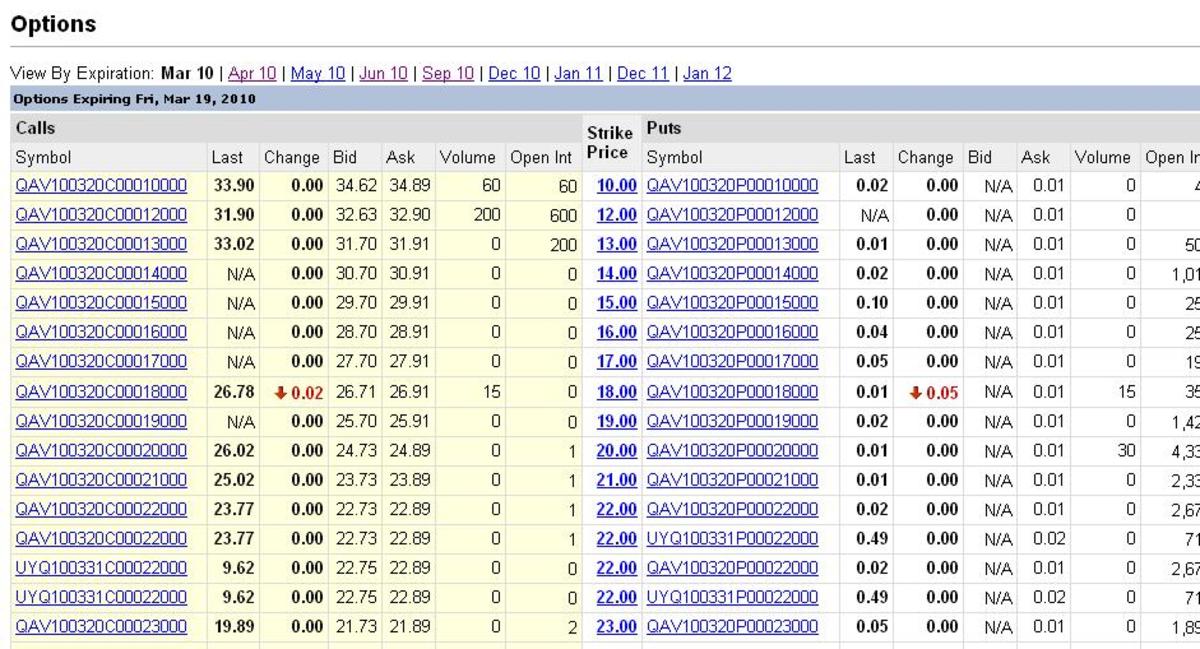401k Rollover into an IRA or New Employer's 401k
The 401k is easy to be seduced by. But… Social Security is going to be all dried up before the people entering today’s workforce are anywhere near retirement age, 401k’s are only reliable if you know how to play your cards right, and to call the stock market “unpredictable” would be putting it nicely.
There’s no gentle way of putting this: The road to a comfortable retirement is covered in landmines.
So if you’re hoping to retire in even modest comfort, you can’t afford to coast, you’ve got to keep your eyes on the road and your hands on the wheel. This goes for the young folks out there, as well. The sooner you can get your retirement investments rolling, the better. We all know that, economically, we’re all standing on shaky ground, so you’ve got nobody to blame but yourself if you start planning a little too late in the game and have to stay in the workforce longer than you’d hoped.
TWM: 401k Advice

If you’re going with a 401k plan, start considering what to do in the event that you go to another employer. Even if you’re completely happy with your current position, even if you’ve got an excellent track record, a 401k and ten years with the company, you should have a Plan B. You never know what might happen another ten years from now. If you move to another area, if your company is forced to downsize and lay off valued employees, or even if you just want a change of pace, you might very well need to find another company. If you don’t have at least a rough idea of what to do with your 401k, you may wind up making a decision hastily, simply because you hadn’t really thought about it yet.
And you don’t want your retirement plan to be something you “never really thought about”.
401K Strategy
Recession-Proof Your 401K
Getting Started – 401k Pre-Planning
If you’ve never really given serious thought to a 401k plan before, you might want to read up on the basics to familiarize yourself with how this plan works.
When you leave one company for another, you have a few options regarding what to do with your 401k. 401k rollover options are definitely to be considered.
- Roll your 401k over into an IRA …
- Leave your retirement money where it is, or…
- 401k rollover into your new employer’s plan.
No one of these options is always preferable to the other two. It really depends on your plan. Check out your 401k rollover rules - carefully.


Weighing the 401 k Pros and Cons
Here are some things to consider before making your decision…
Do not move your employer stock around
Even if you wind up doing a 401k rollover into a new employer’s plan or an IRA, leave your employer stock right where it is. When your stock is in the company that you work for, it receives special treatment when it comes to taxes.
Say for example, you wind up with a million bucks in your employer-stock when it’s time to retire. If you had transferred that over into an IRA plan, you might be subject to as much as thirty five percent taxation, withdrawing that stock as regular income. Leaving the former employer-stock in the hands of your former employer’s 401k (or reinvesting it into your current company’s stock), you would only be taxed on long term investment gains, meaning that the taxation would be more like fifteen percent. That tax cut would no longer apply should you roll over into an IRA.
Further 401k Reading
This hub can get you started, but you probably want to get as much information as you possibly can before making a decision, and even beyond that, staying educated is the only way to get the most out of whatever plan you settle on. Below, you’ll find a few websites that should prove helpful…
401k rollover to an IRA
- 401k Helpcenter
Full of information and advice from experts and laymen alike regarding how to manage a 401k. If you’d like to stick with a 401k, this site comes recommended, but even if you’re leaning towards an IRA, you might find some relevant info here. - Financial Articles
Whether you go with your old 401k, a new 401k, or an IRA, there are dozens of websites like this one all over the internet, all loaded with articles that can help you plan your retirement account wisely. - State Tax Roundup
Tax info by state. This is definitely worth looking at if you’re planning on moving when you retire. The rest of bankrate.com is full of helpful articles, tools, and advice, as well. - Investopedia.com - Your Source For Investing Education
Not exactly like wikipedia.com for investors. Rather, Investopedia, a Forbes Digital Company, is a site that’s pretty much packed with hundreds of articles, tools, and other resources for investors and future retirees. - MSN Money
The retirement section of MSN’s Moneycentral.msn.com website. A pretty comprehensive resource for retirees and future retirees. The rest of the Money Central site is also recommended for anyone looking to make some smart investments. - IRS Forms and Publications
From the official IRS site. Here you can find all the necessary forms and publications you might wind up needing to keep everything in order, as well as plenty of information regarding what you might need to pay, and potential tax breaks on your reti - Retirement Living Information Center
In case you’re not sure what in the heck you’re going to do after retiring into a comfortable, but possibly boring lifestyle. If you’ve already got plans, just skip this one, but remember that you’ll want to think about your post-retirement goals whe - AARP: Health, Travel, Baby Boomers, Elections, Financial Planning, Family, Games, Volunteer, Retirem
Nobody wants to admit when the AARP becomes a group they’re considering joining, but any future retiree would do well to visit the site and find some retirement financing advice from the American heavyweight experts in the field. - Rollover aidi
Articles about rolling over a 401k
Look at your Investment Options
Most of the time, IRA’s have a whole heck of a lot more options for investing your money than a 401k plan will. If you go with an IRA, you’ll have more freedom.
However, that’s not always the case, nor is it always an upside. For example, if you really just don’t want to worry about it, you can usually stick with your old 401k, rollover this into your new employer’s plan, and get a relatively safe investment. If you’re already pretty happy with what you have going for you in your current 401k for a while at least, it might be wiser to just leave well enough alone. IRA’s can be more rewarding, but they’re also, you might say, more high maintenance. They require a little more of a personal interest in investing, and a bit of research on your part.
On the other hand, if you’re not all that happy with your current 401k, for whatever reason, or if you’d just like some more freedom to move your money around, rolling your 401k money over to an IRA plan can be immensely rewarding for a smart retirement investor.
Try to Avoid Transfer Penalties
If you’re not careful, you stand to lose around twenty percent when you roll your money over into a new plan. When you move funds around and do a 401k rollover, shifting stock over into either an IRA, or a new employer’s 401k plan, you should have your former employer send the money directly into your new plan. 401k rollover rules allow that you can actually do as many of these per year as you like, meaning that you could jump from company to company once a month (not recommended, but for the sake of argument), and not lose anything.
Taking the money from your 401k and into your own custody, you’ll have twenty percent taken out as income tax, just in case you decide not to put that money into an IRA or another 401k. And you only get sixty days after that to hurry up and stuff that money into another qualified plan before the IRS gets to keep their cut.
Even if you can stay on top of things and put the money into another plan before your sixty days are up, you only get to do this once a year, so you don’t really want to rely on this method unless you can be one hundred percent sure you’re sticking with your new employer for awhile.
401k in Estate Planning
Nobody wants to think about planning for the event of their demise, especially not when they’re already talking about retirement… but, if you want to make sure your bases are covered, if you want your family to be taken care of, it’s something that has to be considered.
With most 401k plans, your heirs will have to take your assets shortly after your death. The problem here is that they will probably wind up facing a pretty serious tax burden. Some 401k rollover rules will allow a spouse to roll the inherited money over from a 401k and into an IRA, while others will allow non-spousal rollovers.
Financial advisors strongly recommend that you only try to stay in a 401k plan that allows non-spousal rollover into IRA as part of the 401k rollover options.
The benefit of using an IRA is that retirees are given a lot more freedom in allowing their heirs to take small withdrawals from their inheritance, whereas a 401k plan almost always requires that the money be taken in one lump sum (and that’s where the tax burden comes in). Besides which, an IRA or non-spousal 401k plan makes it a whole lot easier for a retiree to have multiple heirs.
So if your 401 k plan does not allow non-spousal rollover, that might be incentive to put your money into an IRA plan now.

Retiring Early?
IRA’s will deal out a ten percent penalty to anyone making a withdrawal before they reach the age of fifty nine and a half. With a 401k, you can start making no-penalty withdrawals at the age of fifty five.
Even if you won’t be ready to retire, if you think you might want to make some withdrawals in your mid fifties, it might be wise to stick with the 401k.
Furthermore, once a retiree reaches the age of seventy one and a half, they have to start taking minimum required withdrawals from their retirement accounts, with the one exception being that a seventy one year old who is still working does not have to take withdrawals if their retirement account is a 401k.

Making a Choice on 401k
As you can see, it’s not an obvious choice. For everything that might have you leaning towards an IRA, there’s something else that might have you wanting to keep your 401k in the place where it currently is. For everything having you wanting to keep your 401k where it is, there’s something that might lean you towards moving it to a new employer’s plan.
What you need to do is look at all of your options, all of your plans, and all of your finances. Look at what you’re getting from your current plan, and look at what you might get from a new plan. Consider what you stand to lose by going from one to another, as well as what you stand to gain.
Read about it, think about it, ask a financial advisor about it, if that’s within your means, and come to a careful, informed decision.
This hub brought to you....
by Julie-Ann Amos, professional writer, and owner of international writing agency www.ExquisiteWriting.com
Why not create your own HubPages? It's fun and you can make revenue from Adsense and other revenue streams on your pages. JOIN HUBPAGES NOW
This work is licensed under the Creative Commons Attribution-Non-Commercial-No Derivative Works 3.0 Unported License. To view a copy of this licence, visit http://creativecommons.org/licenses/by-nc-nd/3.0/ or send a letter to CreativeCommons, 171 Second Street, Suite 300, San Francisco, California94105, USA.








